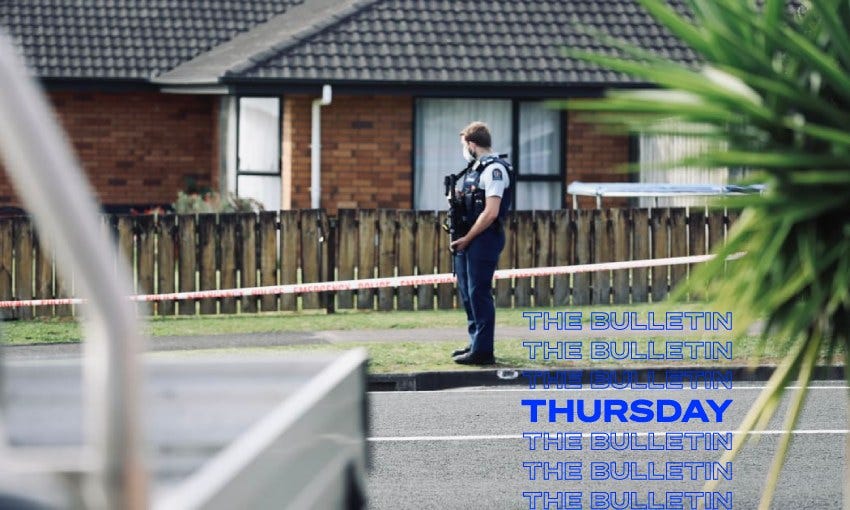Gun control, here and abroad
The PM rightly received applause for our ban on semi-automatic weapons yesterday. Back home, police did not answer a question about gangs stockpiling guns.
Mōrena and welcome to The Bulletin for Thursday, May 26, by Anna Rawhiti-Connell. Presented in partnership with Z Energy.
In today’s edition: Reserve bank forecasts further OCR hikes; China seeking security deal in Pacific; new novel from NZ luminary but first, escalating gang violence and gun control.
Police guard a property in Papatoetoe after it was shot at (Photo: RNZ/Marika Khabazi)
Prime minister responds to shooting in US
Yesterday afternoon the prime minister appeared on The Late Show with Stephen Colbert. In the wake of mass shooting in Uvalde, Texas where 19 children were killed, Colbert asked how we had managed to ban semi-automatic weapons so quickly after the Christchurch mosque shootings. Ardern’s response received applause from the audience. As it should. I simply can not put into words how difficult I find the situation in the US to comprehend. There is the magnitude of tragedy and then there is the sense that it will never stop in a country utterly paralysed by the gun lobby.
Police did not answer question about how gangs here continue to stockpile arms
A few hours before Ardern’s appearance, police superintendent Jill Rogers fronted a press conference here to address the spate of gang-related shootings in Auckland. Asked how the gangs were continuing to stockpile arms, Rogers did not answer. Now, there is a chasm between what has happened in the US and what has happened here, just as there is in our laws and culture around guns and gun control. That we quickly and seemingly simply enacted legislation to ban semi-automatic weapons is absolutely incredible to people in America. On the other hand, the recent shootings here raise questions about guns in our own community.
We don’t currently know who owns guns in New Zealand
Jarrod Gilbert, sociologist and author of Patched: The history of gangs in New Zealand, told RNZ’s Morning Report yesterday morning that a firearms register is an absolute necessity to find out where firearms are going in New Zealand. Gilbert has also helmed research published recently that found laws to combat gangs have almost no impact. There was $210 million for a police firearm’s unit and register allocated in the budget this year. I feel extremely naive saying this but I was genuinely shocked when, at the announcement of the funding, police minister Poto Williams said we’ve had no idea who owns guns and how many they own for 30 years.
Luxon would ditch firearms register funding
In responding to the news of the shootings in Auckland, National Party leader Christopher Luxon bounced the ball back into the government's court, saying it needs to stop being soft on crime. Speaking to the AM show yesterday he said he’d reallocate the $210 million for a firearms register into firearms prohibition orders that would give police search warrant powers to go after illegal guns. He also said the country needs a dedicated unit to deal with all gang-related crime. This naturally conjured the spectre of Strike Force Raptor, a proposal the National party floated in 2020 and then backed down on. Police have recently launched Operation Cobalt to tackle growing violence between gangs.
In partnership with Massey University, we’re very excited to announce the third season of Conversations That Count – Ngā Kōrero Whai Take, our thought-provoking podcast series about the issues facing Aotearoa and te ao whanui. The season’s first episode takes a close look at what’s wrong with literacy education in New Zealand. We know that our learners are falling behind global benchmarks, but do we know why? And what can we do to correct this worrying trend? Join host Stacey Morrison and guests Dr Christine Braid, Helena Baker and Josie Woon for an insightful, challenging and ultimately optimistic kōrero about this hugely important issue – click here to listen on The Spinoff Podcast Network, and make sure to subscribe for new episodes monthly. (Sponsored)
Cost of living payment “evaporated” as Official Cash Rate rises
As predicted the Reserve Bank lifted the OCR to 2% yesterday. More noteworthy, however, was the forecast for the OCR. It indicated the cash rate may now peak at 3.9% in June 2023 instead of 3.4% by mid 2024. As the NZ Herald’s Liam Dann writes, the forecasts and tone of the statement suggest an increasingly aggressive approach to inflation. Speaking to RNZ’s Checkpoint last night, Kiwibank's chief economist Jarrod Kerr said the government's cost of living payment for those with a home loan had essentially evaporated and the risk of recession increases the more monetary policy tightens. He questioned whether the cash rate needed to go to 4% at all, saying “We're only a few hiccups away from a recession with the rate at which mortgage rates are rising”.
China seeking security deal with Pacific countries
China’s foreign minister Wang Yi arrives in the Solomon Islands this week as part of a ten day visit to eight Pacific countries. After citing a draft agreement sent ahead of the trip, Reuters broke a story last night about China seeking a region-wide deal with ten Pacific countries covering policing, security and data communications cooperation. Foreign minister Nanaia Mahuta spoke with Solomon Islands Foreign Minister Jeremiah Manele yesterday for the first time since a security pact was signed between the Solomons and China. She received assurances that the pact would not lead to a Chinese military base.
The Spinoff wouldn’t exist today without the generous support of our members.
If you want to support what we do, please consider joining up. There is no minimum to donate and you’ll not only help make local journalism happen but gain a bunch of great member-only perks, including a world version of The Bulletin, written by Peter Bale, delivered direct to your inbox every Thursday, less advertising, an RSS feed, cool merch and more. Join today!
New Eleanor Catton book out in 2023
Ten years after the Booker-prize winning novel The Luminaries was published, author Eleanor Catton’s new novel will be with us in 2023. Birnam Wood will be published by Te Herenga Waka University Press in February and around the world in March 2023. The book’s title and subject matter were announced in 2017. The new novel is described as a “gripping thriller…Shakespearean in its wit, drama and immersion in character”.
Catton’s publisher Fergus Barrowman said “Publishing Ellie’s novels has been a highlight of my life, and I can’t wait to share her new masterpiece with readers.” Since The Luminaires, Catton has adapted the novel for television and Jane Austen’s Emma as a feature film. The race is now on for those of you who haven’t read The Luminaries to do so before next February.
Got some feedback about The Bulletin, or anything in the news? Get in touch with me at thebulletin@thespinoff.co.nz
For many of our best actors, Shortland Street has been a stepping stone on the path to international fame and fortune. But who's the most successful of them all? Various Spinoff writers make the case for their favourites. Alice Neville takes a culinary tour through 30 years’ worth of Shortland Street's hospo hot spots, while Sam Brooks gets an insight into what it takes to be an actor on a show with a production schedule like a runaway train. Chris Schulz wonders where all the expensive NZ On Air funded TV of yesteryear has gone. And Madeleine Chapman pens a dispatch from the front lines of the so-called war on men.
“Manchester United are rubbish”
The venerable BBC has had to issue an apology for an item that ran on its breaking news ticker that said “Manchester United are rubbish”. Two hours after viewers spotted it, the channel's news anchor had to explain that the message was displayed “in error during a training exercise”. To be fair to whoever that poor person is, an item also ran on the ticker saying “Weather rain everywhere”. A sports journalist for the ABC in Australia said on Twitter: “Apologies to @BreakfastNews news viewers who are Manchester Utd fans. You’re right - ‘Manchester United are rubbish’ is wrong & should not have appeared on the @BBCSport ticker. ‘Manchester United IS rubbish’ is both grammatically and factually correct.” All I’ll say is she is right on the grammatical rule, and for that reason, my editor appreciates the tweet.
A feature today
I’ll leave you with The Atlantic’s David Frum and his parabolic “The Rules of the Gun Debate” from 2017.
“After especially deadly events, the villagers solemnly discuss what they might do to protect themselves. Perhaps they might raise their homes on stilts? But a powerful faction among the villagers is always at hand to explain why these ideas won’t work. ‘No law can keep our village safe! The answer is that our people must learn to be better swimmers—and oh by the way, you said stilts” when the proper term is “piles”, so why should anybody listen to you?’”












Thank you for your excellent coverage about the need for a gun register in NZ. It's shocking that we don't have a comprehensive one (there is one for pistols only), given how many lives it could save. I think NZ needs to wake up to the dangers the 1.2+ million guns in NZ represent, 2.5 more guns per capita than in Australia. I welcome more coverage about this issue--and legislation-- before we have another mass shooting. Years ago I joined Gun Control NZ.org--it's one small thing we can do.
Wrong, wrong, wrong. In British English it is perfectly grammatical to say "(collective noun) are rubbish". The Board are rubbish. etc. It is a standard construction that is universally accepted as correct.
Your editor and your moronic Australian journo friend need to stop reading American style guides and start learning the actual language they purport to be experts in: English.